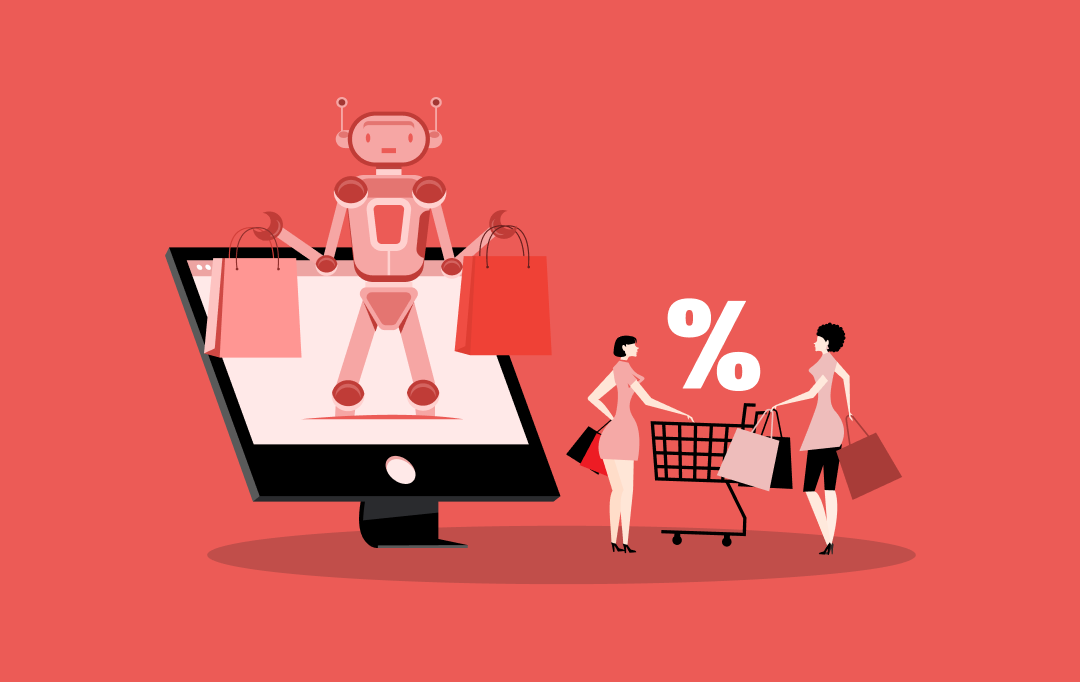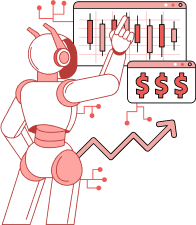- Beyond Automation: The Core Benefits of AI Agents in Retail Industry
- Making Customers Happier & Experiences Super Personal
- Smarter Operations & Seriously Cutting Costs
- Decisions Based on Real Data & The Power to Predict
- Boosting Efficiency & Scaling Up Effortlessly
- Gaining a Real Competitive Edge & Driving Innovation
- 10 Transformative Use Cases of AI Agents in Retail Where They Revolutionize Digital Retail Operations
- 1. Your Personal Shopping Sidekicks & Super Smart Recommenders
- 2. Super Smart Inventory Management & Spot-On Demand Forecasting
- 3. Dynamic Pricing & Smarter Promotion Optimization
- 4. Ultra-Personalized Customer Service & Support (Think Chatbots & Virtual Agents!)
- 5. Super-Optimized Supply Chain & Logistics
- 6. Spotting & Stopping Fraud Before It Happens
- 7. Unlocking Retail Analytics & Business Intelligence Goldmines
- 8. Laser-Focused Marketing & Advertising Campaigns
- 9. AI That Predicts Customer Behavior and Emerging Trends
- 10. Empowering & Training Your Digital Sales Teams
- Other Revolutionary Ways AI Agents Are Powering the Retail Innovation
- How to Implement AI Agents in Retail: Choosing the Right Approach
- The Future of AI Agents in Retail: What’s Around the Corner?
- Figuring Out AI Agents: The Hurdles and Smart Moves to Make
- Challenge 1: Getting Your Data Ready and Your Systems in Order
- Challenge 2: The Talent Gap and Needing to Reskill Your Team
- Challenge 3: Ethical Worries and Building Trust
- Challenge 4: Risky Implementations and Making Sure It Can Grow
- Looking Ahead: Why AI Agents Aren't Just an Option, But an Absolute Must-Have
- The "You Have to Be in It To Win It" Factor
- What Customers Expect: Seamless Experiences, Always
- Getting Ready for the Next Big Wave of Retail Innovation
- Appinventiv: Helping You Power Up Your Retail Business with AI Agents
- FAQs
Key takeaways:
- AI agents in retail industry are revolutionizing businesses by enhancing customer experience and streamlining operations.
- From personalized recommendations to predictive analytics, AI offers tangible benefits like increased conversions and reduced costs.
- AI adoption can lead to scalable growth and a competitive edge in the retail industry.
- Retailers must consider data strategies, talent development, and ethical AI practices to ensure successful AI integration.
Let’s be honest, running a retail business has always been a bit of a juggling act, right? From the headache of keeping track of what’s in stock and making sure customers get quick help, to bigger challenges like fighting fraud and dealing with unexpected bumps in the supply chain – it’s a constant game of whack-a-mole.
But here’s the exciting part: there’s a powerful new player in town – AI agents! Think of them as your super-smart digital assistants, and they’re completely changing how retail operates. They’re not just patching up old problems; they’re actually making everything smoother, happier for customers, and way more efficient behind the scenes.
And get this, the impact is huge. Currently, 75% of retailers prioritize using AI Agents to compete and excel in the industry. According to recent research from McKinsey, generative AI alone could pump an extra $310 billion into the retail industry! That’s a massive boost across everything from marketing and how we talk to customers, to just running the show more efficiently.
Take a look at Adidas, for example. This retail giant leverages AI not merely for improving its online shopping interface but for fine-tuning its entire digital operation. We’re talking personalized recommendations that feel like a friend knows exactly what you want, smart systems that keep inventory just right, and customer support that’s there for you in real-time.
Also Read: How Appinventiv Helped Adidas Brand Expand Its Mobile Presence in ME
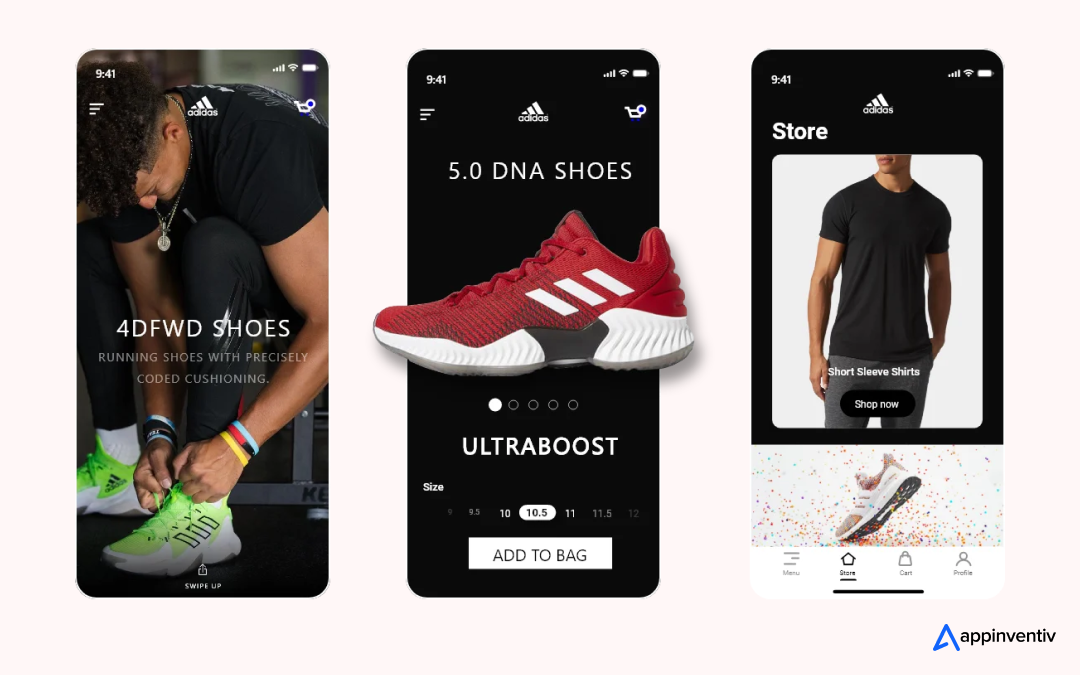
It’s how Adidas stays ahead, consistently meeting—and even exceeding—what shoppers expect today. They are a prime example of how AI agents in retail industry are truly revolutionizing the landscape, making things smoother, experiences more personal, and businesses simply more effective.
So, in this article, we’re going to pull back the curtain on 10 amazing ways AI agents are transforming retail. We’ll explore the incredible benefits they bring and show you how embracing these smart solutions can give any retailer a serious competitive edge. By the time you finish reading, you’ll have a much clearer picture of how AI agents can not only help you conquer today’s retail challenges but also set your business up for some serious future success.
Consult with our AI experts to learn how AI agents can transform your retail operations.
Beyond Automation: The Core Benefits of AI Agents in Retail Industry
Now, when you hear “automation,” you might picture robots doing the same thing over and over, right? But here’s the cool part: AI agents are so much more than just simple task-doers. They actually learn, they adapt on the fly, and they can even predict what’s coming next. This means they’re kicking off a whole new era of smart, strategic power for online retailers. Let’s really dig into some of the amazing core benefits that AI agents bring to the retail world:
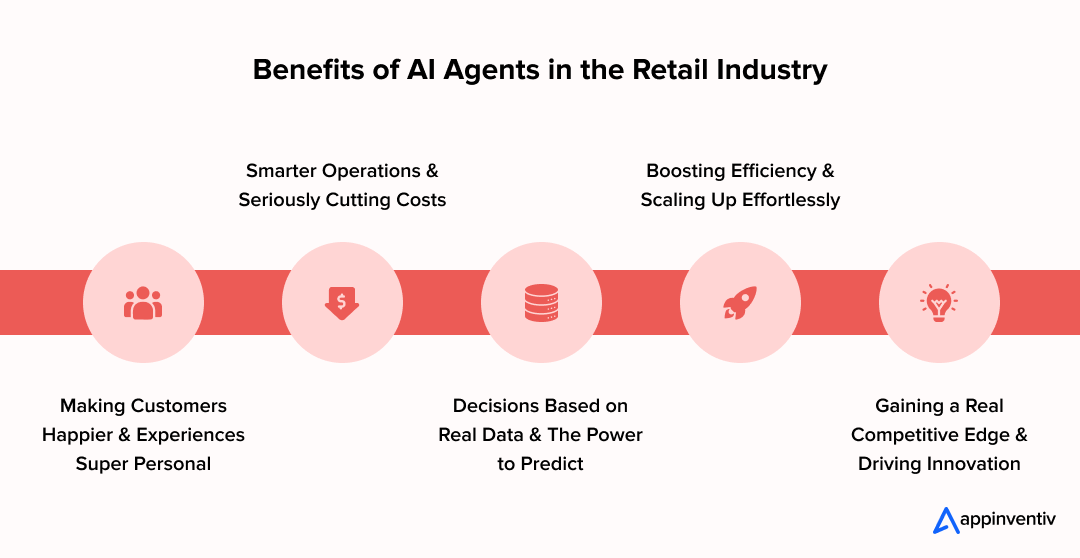
Making Customers Happier & Experiences Super Personal
Think about it: in the online shopping world, giving customers an incredible experience is what truly sets you apart. AI agents in retail customer experience are masters at this! They whip up personalized shopping journeys by really digging into what shoppers browse, what they like, and what they’ve bought before.
Every single interaction feels like it was made just for you, which seriously boosts engagement, builds stronger loyalty to your brand, and ultimately means customers stick around longer and spend more. This is exactly how AI agents improve retail experiences.
Smarter Operations & Seriously Cutting Costs
We all know efficiency directly boosts your bottom line, right? Well, AI agents are fantastic at streamlining those complicated behind-the-scenes processes, from keeping track of inventory to managing all the logistics. By taking over routine tasks, cutting down on human errors, and giving you those crystal-ball-like predictive insights, they slash operational overheads in a big way.
This translates directly into some significant cost savings and better profit margins, which then frees up your capital for exciting growth opportunities. These operational wins are a massive plus for any AI agent in retail industry.
Decisions Based on Real Data & The Power to Predict
Imagine having a super-smart assistant who can turn mountains of raw data into genuinely useful insights. That’s what AI agents do! They go way beyond just basic number-crunching, using advanced algorithms to uncover hidden trends, foresee outcomes, and spot opportunities with incredible accuracy.
This ability gives you precise, real-time insights, basically turning your data into a strategic compass guiding your retail growth.
Boosting Efficiency & Scaling Up Effortlessly
Unlike human teams, AI agents have virtually limitless capacity. They can handle enormous amounts of data and transactions with ease, making sure everything runs smoothly even during those crazy busy periods. What’s more, these solutions are built to scale.
As your e-commerce business grows, it expands effortlessly right along with you, keeping performance consistent and high-quality without a proportionate jump in overhead. This impressive scalability is a huge advantage of AI agents in retail applications.
Gaining a Real Competitive Edge & Driving Innovation
In a market flooded with choices, true innovation is how you genuinely stand out. Adopting AI agents in the retail industry gives you a significant competitive edge. They let you offer superior customer experiences, be much more agile in your operations, and react to market shifts at lightning speed. This constant drive for innovation empowers businesses to lead the pack, setting new standards and attracting customers who are always on the lookout for cutting-edge, convenient shopping.
10 Transformative Use Cases of AI Agents in Retail Where They Revolutionize Digital Retail Operations
Now, let’s zoom in on the specific battlegrounds where AI agents are not just helping but actively revolutionizing the digital retail space. These are the areas where AI agents in retail applications are turning challenges into opportunities and redefining what’s possible for online businesses.
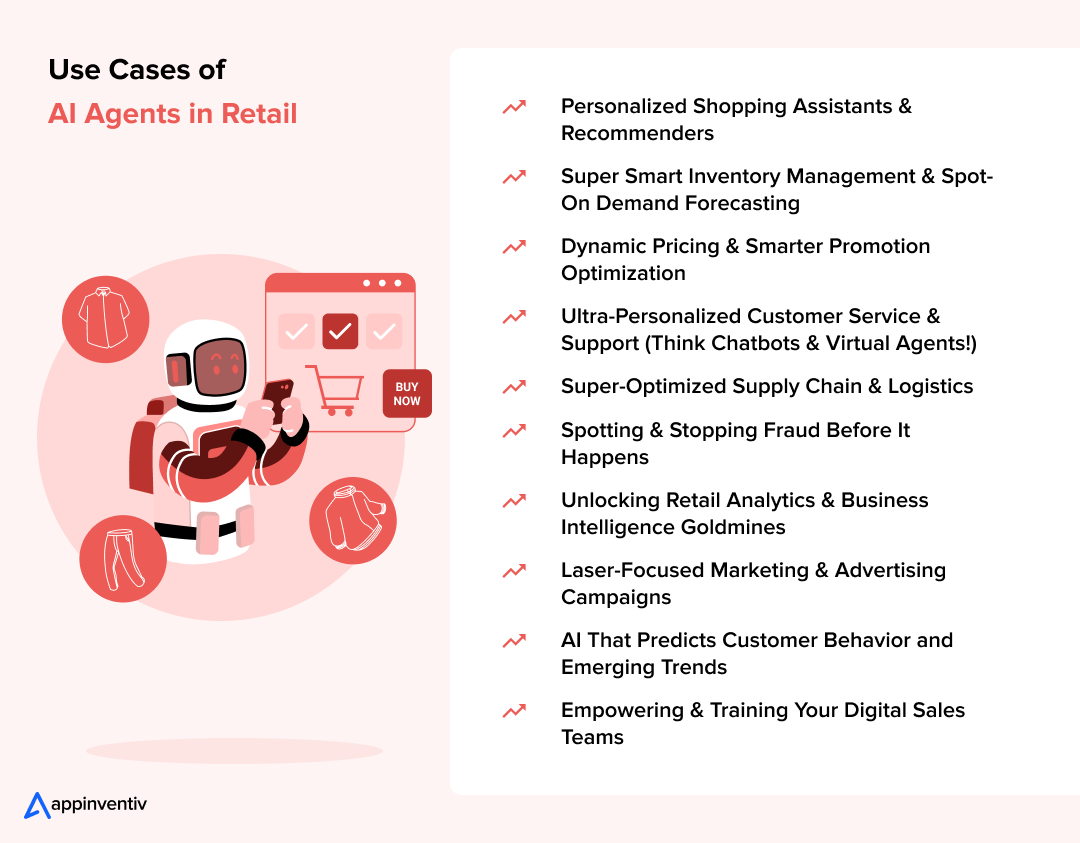
1. Your Personal Shopping Sidekicks & Super Smart Recommenders
Picture this: an online store that actually gets what you want. That’s the incredible power of AI-powered shopping assistants and those clever recommender systems. They painstakingly dig through a customer’s entire digital footprint – think browsing habits, past purchases, and even what they’re doing right now – to suggest products that are uncannily relevant.
We are way past those generic “you might also like” prompts here. This creates a shopping journey that feels truly custom-made, super engaging, and incredibly effective. It’s a core job of AI agents for the retail industry, making the whole shopping flow just better.
Benefit: What you get is a noticeable jump in sales (conversions!) and much happier customers, all because those tailored product recommendations make shopping feel so intuitive. It helps cut down on that overwhelming feeling of too many choices and gently guides customers straight to what they’re looking for, or even helps them discover something new they’ll love.
Real-World Example: Our work with Edamama really shows how a good AI agent for retail product recommendations can seriously ramp up engagement.

2. Super Smart Inventory Management & Spot-On Demand Forecasting
For anyone selling online, managing inventory can be a massive headache. But AI agents gracefully handle inventory by bringing unmatched precision to digital inventory management and demand forecasting. They don’t just rely on old averages; they pull in real-time sales, returns, promotions, seasonal shifts, and even outside factors to predict demand with astonishing accuracy. This lets you use “just-in-time” inventory strategies, cutting down on waste and improving your cash flow.
Benefit: The end result is an incredibly cost-efficient inventory system, far fewer times you are out of stock, and better profit margins, all thanks to smarter storage and snappier online order fulfillment. This is truly where AI agents in the retail industry shine, turning a major cost center into a real strategic advantage.
Real-World Example: Walmart, for instance, uses AI extensively to fine-tune its massive inventory across both its online and physical stores. Their machine learning algorithms forecast product demand by crunching enormous amounts of data. This helps them avoid running out of popular items and also stops them from costly overstocking, keeping everything running at peak efficiency.
Also Read: Machine Learning in Retail: Top 10 Use Cases and Benefits
3. Dynamic Pricing & Smarter Promotion Optimization
In the fast-paced world of e-commerce, setting one price and sticking to it is totally old school. Dynamic pricing, powered by AI agents for retail pricing strategies, lets you tweak prices in real-time.
This isn’t random; it’s driven by a ton of intricate factors: what competitors are doing, sudden shifts in demand, current inventory levels, even the time of day, different customer groups, and browsing behavior. This smart system makes sure products are always priced just right to bring in the most money and profit, adapting to market ups and downs every single moment.
Benefit: This strategy guarantees you’ll maximize revenue and boost profitability by perfectly matching prices with subtle demand signals and ever-changing market conditions, leading to optimal sales performance. It truly empowers retailers to get the most value from every single transaction.
Real-World Example: Uber is famous for using a dynamic pricing strategy in its operations. This helps them get the most revenue during busy times and boost sales when things are slower, giving them incredible flexibility. This innovative pricing for AI-powered retail agents fundamentally changes how businesses approach sales.
4. Ultra-Personalized Customer Service & Support (Think Chatbots & Virtual Agents!)
Say goodbye to those annoying phone menus and generic email replies that leave you frustrated. AI-powered chatbots and virtual agents are completely revolutionizing digital customer service, making it seamless, efficient, and wonderfully personal.
These smart agents can handle tons of inquiries all at once, give instant answers, walk customers through troubleshooting, and even proactively suggest tailored products. They constantly learn and get better with every chat, improving their ability to solve even complex problems. This really highlights exactly how AI agents are revolutionizing customer service in retail.
Benefit: Retailers get 24/7 support, which significantly boosts customer satisfaction, and it dramatically cuts down on operational costs. This frees up human agents to focus on those trickier, high-touch interactions, clearly showing how AI agents in retail applications improve customer experience.
Real-World Example: Sephora’s AI-powered chatbot is a fantastic example, offering personalized beauty advice and product recommendations, almost like having a virtual consultant. By chatting with customers in natural language, it intelligently understands preferences and suggests perfect products.
5. Super-Optimized Supply Chain & Logistics
The digital retail supply chain is incredibly complex and, let’s be honest, often quite fragile. But AI agents for supply chain management in retail industry bring unparalleled clarity and intelligence to every step, from buying materials to that final delivery to your customer’s door. They can foresee bottlenecks, find the best routes, automate warehouse tasks, and make sure products reach customers quickly and cost-effectively. This minimizes errors and maximizes delivery speed – a critical differentiator in e-commerce.
Benefit: The outcome is operations that are demonstrably more efficient, drastically shorter delivery times, and a much better alignment between your digital inventory and what customers actually want, directly impacting both profitability and customer happiness.
Real-World Example: Zara uses AI extensively for real-time inventory tracking, ensuring timely deliveries for its fast-fashion model. AI helps them accurately predict demand and quickly restock popular items, greatly reducing the times they are out of stock.
6. Spotting & Stopping Fraud Before It Happens
In the vast digital landscape, online fraud is always lurking and constantly evolving. AI agents are right there on the front lines. They analyze huge amounts of transaction data in real-time, including purchase history and weird behavioral quirks, to quickly spot suspicious patterns that a human eye would simply miss. This proactive approach vigorously protects both the retailer from losses and the customer from identity theft. This clearly shows how AI agents can help detect fraud in retail transactions.
Benefit: The result? Much stronger security for online transactions, significantly fewer losses due to fraud, and a substantial boost in customer trust, knowing their digital purchases are actively safeguarded.
Real-World Example: Mastercard uses advanced AI to detect fraudulent transactions in real-time by analyzing patterns. If an AI system flags something unusual in spending, it can automatically alert the financial institution or even block the transaction, preventing any damage.
Also Read: Financial Fraud Detection Using Machine Learning
7. Unlocking Retail Analytics & Business Intelligence Goldmines
While AI agents are busy running the show, they’re simultaneously generating an incredibly valuable trove of data. Then, AI-powered analytics and business intelligence tools meticulously sift through all this vast data to uncover deeper, nuanced insights into customer behavior, sales trends, market shifts, and how well operations are performing. This goes beyond just basic reports, providing crucial AI analytics insights that guide strategic decisions and reveal exciting new growth opportunities you might never have seen.
Benefit: The direct perks include massively improved decision-making, instant access to incredibly actionable insights into how consumer behavior is changing, and the ability to craft significantly better business strategies that are genuinely informed by data and truly responsive to market dynamics.
Real-World Example: Target uses sophisticated AI-driven analytics tools to keep an eye on complex consumer behaviors and sales data from its e-commerce platforms. This rich data empowers Target to perfectly place products on its website, truly understand how customers feel from digital interactions, and make highly data-backed decisions that steer their strategies.
8. Laser-Focused Marketing & Advertising Campaigns
Those days of “spray-and-pray” marketing are definitely over. AI agents in eCommerce make hyper-targeted marketing and advertising campaigns possible by precisely segmenting audiences based on what they’re likely interested in, their past actions, and their intent to buy. They automate ad placement, fine-tune bidding, and continuously A/B test different ad creatives to ensure you get the absolute maximum return on every marketing dollar spent.
Benefit: This leads to marketing campaigns that are significantly more effective, with a substantially higher return on investment. You’re delivering highly targeted advertisements to the right audience at the perfect moment, maximizing conversion rates and making sure not a single penny of your ad spend is wasted.
Real-World Example: We developed the 6th Street e-commerce app, which included features specifically designed to optimize marketing reach and personalization.

9. AI That Predicts Customer Behavior and Emerging Trends
Beyond just looking at past data, AI agents have this amazing ability to predict future customer behavior and emerging market trends. By spotting subtle patterns in huge datasets, they can forecast which products will be popular, which customers might leave, and what marketing messages will really hit home. This foresight allows retailers to proactively adjust their strategies, from developing new products to figuring out how to keep customers. This is a key part of AI agents in personalized retail.
Benefit: The outcome is increased customer loyalty and higher retention rates, all thanks to proactive, data-driven predictive insights and precisely targeted offers that truly make customers feel valued and understood, ultimately boosting their lifetime value.
Real-World Example: Starbucks leverages AI to predict individual customer preferences and proactively offer personalized deals through its app. By analyzing purchase history, visit times, and location, Starbucks tailors offers to encourage repeat purchases and boost retention.
10. Empowering & Training Your Digital Sales Teams
Even though we’re mostly talking about online retail, AI agents also powerfully enhance the human touch behind digital operations. AI-driven tools give your online sales associates (like chat support teams) real-time product information, instant access to customer history, and even suggest the best responses. AI also helps with adaptive training, making sure your teams are always up-to-date on product knowledge and best practices.
Benefit: This dramatically boosts how efficient your digital sales associate teams are, letting them provide more informed, personalized, and consistent support. This, in turn, enhances customer engagement and satisfaction online, turning potential frustrations into genuinely positive experiences.
Real-World Example: Lindex, a fashion retailer, uses “Lindex Copilot,” an AI-powered assistant for their sales associates. This tool helps store employees quickly find answers to customer questions about products, stock availability, or even store operations right on the spot.
Other Revolutionary Ways AI Agents Are Powering the Retail Innovation
Beyond all those cool uses and benefits we just talked about, AI agents in the retail industry are actually doing even more behind the scenes to really add value. Think about it:
- Making Work Smarter for Everyone: AI agents for the retail industry can actually predict how many employees you’ll need working at any given time and even handle the nitty-gritty of scheduling shifts automatically. This just makes teams more productive and helps cut down on unnecessary costs.
- Supercharging Your Warehouse & Deliveries: AI agents are fantastic at figuring out the best way to lay out a warehouse, automating how inventory moves around, and even smoothing out those crucial last-mile deliveries. It all adds up to getting products to customers much faster and more efficiently.
- Bringing the Store to Your Couch with AR: Imagine trying on clothes virtually or getting style advice from a “virtual stylist” right on your phone! AI-driven try-on experiences and Augmented Reality (AR) shopping assistants are making that in-store feel possible online, blurring the lines between physical and digital shopping.

Influenced by the diverse and impactful use cases of AI agents in retail industry? Interested in developing a custom AI agent solution for your business but are unsure about the investment required? Well, here is our detailed blog on AI Agent Development Cost, which will explore the crucial factors and pricing that go into bringing your vision to life.
Also Read: AR in Retail: The Future of Immersive Shopping Experiences
How to Implement AI Agents in Retail: Choosing the Right Approach
Bringing AI agents into your retail business isn’t a one-size-fits-all process. Retailers can choose from several implementation models, each with its own pros and cons:
| Approach | Description | Pros | Cons |
|---|---|---|---|
| In-House Development | Best for large retailers with strong technical teams. You get full control and customization, but it requires significant investment and specialized talent. | Full control and customization | High investment requires specialized talent |
| Outsourcing | Hiring external experts or vendors can speed up development and fill skill gaps, but may mean less control and ongoing vendor dependence. | Speeds up development, fills skill gaps | Less control, ongoing vendor dependence |
| Hybrid Approach | Combines in-house strategy with external development resources—balancing speed, flexibility, and control. | Balances speed, flexibility, and control | Requires coordination between internal and external teams |
| Pre-Built Solutions | Quick to deploy and cost-effective, but less customizable. Great for retailers wanting to test AI agents before a bigger commitment. | Quick to deploy, cost-effective | Less customizable, limited flexibility |
| AI as a Service (AIaaS) | Cloud-based solutions from providers like AWS or Azure offer scalable, plug-and-play AI agents for common retail tasks. | Scalable, plug-and-play, easy to deploy | Less customization, reliance on third-party services |
Smart Move: Outsourcing is often the best choice. Why? Because bringing in external experts can seriously speed up development and quickly fill in any skill gaps you might have on your own team.
And when you’re ready to start, don’t try to do everything at once! Instead, start with a pilot in just one specific area – maybe a customer service chatbot to handle FAQs, or a system to get your inventory forecasting dialed in. Learn from what happens, tweak things as needed, and then, as your confidence (and your needs!) grow, you can totally scale it up.
The Future of AI Agents in Retail: What’s Around the Corner?
Get ready, because AI agents are only getting smarter and more capable of handling things on their own. Here’s a peek at what’s heading our way:
- Voice-Activated Shopping: In the coming years, more customers will shop by voice, with AI agents understanding and fulfilling requests instantly. Voice will become a much bigger part of how people shop.
- Next-Level Hyper-Personalization: AI will delve even deeper into various data sources, encompassing everything from online browsing habits to real-world movements, to craft shopping experiences that perfectly suit each individual.
- Self-Improving Agents: AI agents will learn and adapt in real time, continuously improving customer service and operational efficiency
Retailers investing in these innovations today will be best positioned to lead tomorrow’s market.
Figuring Out AI Agents: The Hurdles and Smart Moves to Make
Bringing AI agents for retail industry solutions into your business isn’t just a simple upgrade; it’s a huge, strategic shift that really needs you to think ahead and plan meticulously. If you’re an entrepreneur, a product head, or an innovation leader in retail, truly grasping these key challenges and knowing the right strategic solutions to tackle them is absolutely vital for a successful and impactful transition. So, in this section, we’re specifically going to chat about the good and the tough parts of using AI agents in retail.
Challenge 1: Getting Your Data Ready and Your Systems in Order
The Gist of the Problem: For AI agents to really work their magic, they need strong, clean, and easily accessible data. The snag is, lots of retailers are grappling with data that’s all over the place, inconsistent, or just plain not enough. This truly messes with AI’s ability to learn and perform at its best.
The Smart Solution: You need to really dig in and carefully check your current data setup. Then, strategically invest in building a solid data foundation – often through things like advanced data lakes and cloud-native infrastructure. This makes sure you’re collecting clean, well-organized data from every single digital touchpoint.
Challenge 2: The Talent Gap and Needing to Reskill Your Team
The Gist of the Problem: While AI agents are great at automating tasks, they don’t get rid of the need for human talent; they simply change what that talent needs to do. We’re seeing a growing shortage of folks in the workforce who are equipped to manage, understand, and strategically work alongside advanced AI systems.
The Smart Solution: Get proactive and really invest in training your current team. This means comprehensive training in data analytics, understanding how AI models work (and how to oversee them), grasping ethical AI principles, and learning new ways to engage customers using AI tools. And yes, attracting specialized AI talent from outside is also super important.
Challenge 3: Ethical Worries and Building Trust
The Gist of the Problem: Rolling out AI agents, especially those that talk directly to customers or make big decisions (like personalized pricing for AI-powered retail agents), comes with serious ethical responsibilities. We’re talking about fairness, transparency, and, of course, data privacy.
The Smart Solution: Make ethical AI practices your top priority. Actively look for and address any potential biases in the data you use to train your AI, and make sure you can clearly explain how your AI makes its decisions. Implement really strong data security protocols (like adhering to GDPR and CCPA). Building rock-solid customer trust in your AI-powered interactions is absolutely key.
Challenge 4: Risky Implementations and Making Sure It Can Grow
The Gist of the Problem: Trying to adopt AI all at once – the “big bang” approach – is risky and often just doesn’t work. Integrating complex AI systems can be disruptive and costly if you don’t manage it smartly. This also directly affects the overall cost of implementing AI agents in retail.
The Smart Solution: Go for a clever, phased implementation strategy. Start small with incremental testing and tweaking. Kick things off with pilot programs in areas where they can make a big impact (like an AI chatbot for FAQs or a recommendation engine). This minimizes risk, optimizes your resources, and maximizes the chances of successful integration and adoption, ensuring your solution can smoothly grow with your business needs.
Looking Ahead: Why AI Agents Aren’t Just an Option, But an Absolute Must-Have
The retail world has totally transformed, shifting from physical stores to a dominant digital space in what feels like the blink of an eye. And these aren’t just temporary changes; they’re fundamental, permanent, and happening faster than ever. In this new landscape, AI agents are no longer just a fancy extra for a selective few – they’re a basic requirement for survival, for growing steadily, and for truly captivating your digital audience. This naturally leads us to ask: what are the benefits and challenges of AI agents in retail, and what is the future of AI in shopping?
The “You Have to Be in It To Win It” Factor
The retail industry is incredibly competitive. Brands that are jumping on board with AI agents are gaining ground, offering truly superior, seamless digital experiences and becoming way more efficient, which then translates into better prices and faster service for their customers. Those who hesitate to leverage the benefits of AI agents for the retail industry risk falling behind, unable to keep up with the speed and personalization that AI-powered rivals can offer. This isn’t just about keeping pace; it’s about being at the forefront.
What Customers Expect: Seamless Experiences, Always
Today’s digital consumer expects interactions that are instant, intuitive, and highly personalized at every single touchpoint. They demand accurate product recommendations, 24/7 customer service, and shopping journeys that are totally frictionless. AI agents are the only scalable way to consistently meet and even surpass these expectations, delivering those proactive experiences that build lasting loyalty and turn casual browsers into devoted customers. This is why how AI agents improve customer experience in retail is such a crucial conversation point for any modern business.
Getting Ready for the Next Big Wave of Retail Innovation
The AI revolution is still in its early stages, and the capabilities of AI agents are only going to explode. Retailers who are investing in AI now aren’t just fixing today’s problems; they’re proactively building the systems and the know-how to adapt to and really cash in on the next wave of innovations. This forward-thinking approach ensures long-term resilience, a sustained competitive advantage, and ultimately, market leadership.
Appinventiv: Helping You Power Up Your Retail Business with AI Agents
Look, the world of digital retail is changing at lightning speed, and it’s all thanks to the incredible power of AI agents. These smart digital helpers are totally revolutionizing everything – from making shopping super personal and managing your inventory like a pro, to stopping fraud dead in its tracks and fine-tuning your supply chain. The perks are crystal clear: happier customers, lower costs, smarter choices thanks to AI agents in the retail industry, and a seriously sharp competitive edge.
So, how do you get in on this amazing, transformative power? Don’t you worry, because we’re right here to help!
At Appinventiv, we’ve had the privilege of working with top-tier brands like Adidas, IKEA, Edamama, and 6thStreet. We’ve helped them use AI not just to survive, but to genuinely flourish. Our deep expertise in retail and AI agent development services is specifically crafted to help visionary entrepreneurs really tap into these powerful capabilities.
If you are ready to truly transform how your retail business operates and deliver digital experiences that are simply unmatched, then let’s be straight: AI agents for the retail industry aren’t just a nice-to-have anymore; they are absolutely essential for future success.
Partner with us and hop on to the retail revolution in full swing.
FAQs
Q. How will autonomous AI shopping agents transform retail?
A. AI agents in the retail industry are going to revolutionize retail by making everything incredibly seamless and personal. Imagine them automatically finding what you love, suggesting things you didn’t even know you needed, and handling the entire buying process for you – it’s like having a personal shopper and assistant rolled into one, making retail far more intuitive and efficient.
Q. What is the future of AI in shopping?
A. The future of AI in shopping is all about anticipating your needs and making every interaction feel effortless. We’re talking about AI that predicts what you want before you search, optimizes everything from how products are displayed to how they’re delivered, and creates a shopping journey so smooth and integrated that it almost feels invisible.
Q. How are retail AI agents improving the shopping experience?
A. Retail AI agents are seriously leveling up the shopping experience! They’re providing instant, highly personalized recommendations, offering 24/7 support that actually understands your questions, and solving issues much faster. Plus, they can tailor promotions and content just for you, making shopping feel less like a chore and more like a delightful, relevant discovery.
Q. How do AI agents improve customer experience in retail?
A. AI agents dramatically enhance the customer experience by offering real-time, hyper-personalized interactions. This means customers get immediate, accurate answers to their questions, proactive assistance, and recommendations that truly resonate. It creates a shopping journey that feels uniquely understood and catered to each person, ultimately building stronger relationships and lasting loyalty.


- In just 2 mins you will get a response
- Your idea is 100% protected by our Non Disclosure Agreement.

Governance vs. Speed: Designing a Scalable RPA CoE for Enterprise Automation
Key takeaways: Enterprise RPA fails at scale due to operating model gaps, not automation technology limitations. A federated RPA CoE balances delivery speed with governance, avoiding bottlenecks and audit exposure. Governance embedded into execution enables faster automation without introducing enterprise risk. Scalable RPA requires clear ownership, defined escalation paths, and production-grade operational controls. Measuring RPA…
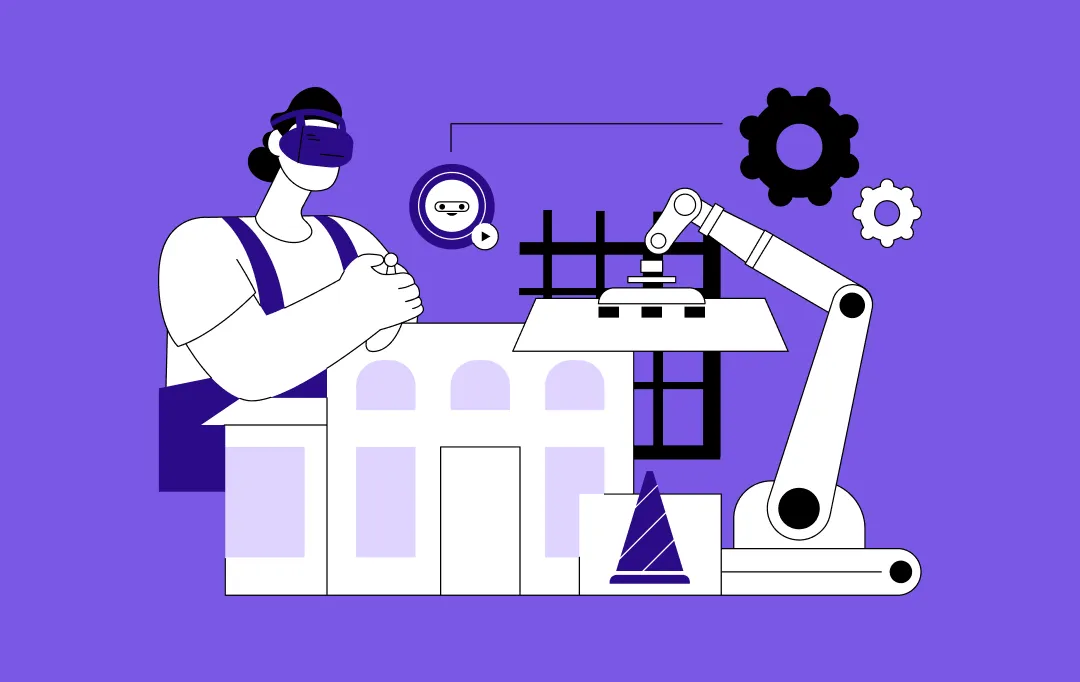
How AI Overhauling Industrial Automation in Australia
Key takeaways: AI is shifting industrial automation from rule-based to data-driven decision ecosystems Predictive and autonomous operations are improving efficiency and cost optimisation Australian industries are leveraging AI to solve workforce, sustainability, and compliance challenges Enterprises adopting AI early gain competitive, operational, and economic advantages Industrial automation in Australia is no longer just an engineering…

Implementing Retrieval-Augmented Generation in Healthcare Systems: Challenges, Use Cases & ROI
Key takeaways: RAG helps clinicians make better decisions by connecting AI responses to trusted clinical data sources. Healthcare organizations are gradually adopting domain-specific AI to improve efficiency, compliance, and operational clarity. Successful RAG deployment usually depends on strong governance, interoperability planning, and secure data practices. Retrieval-backed AI can ease documentation workload while improving accuracy, productivity,…


























